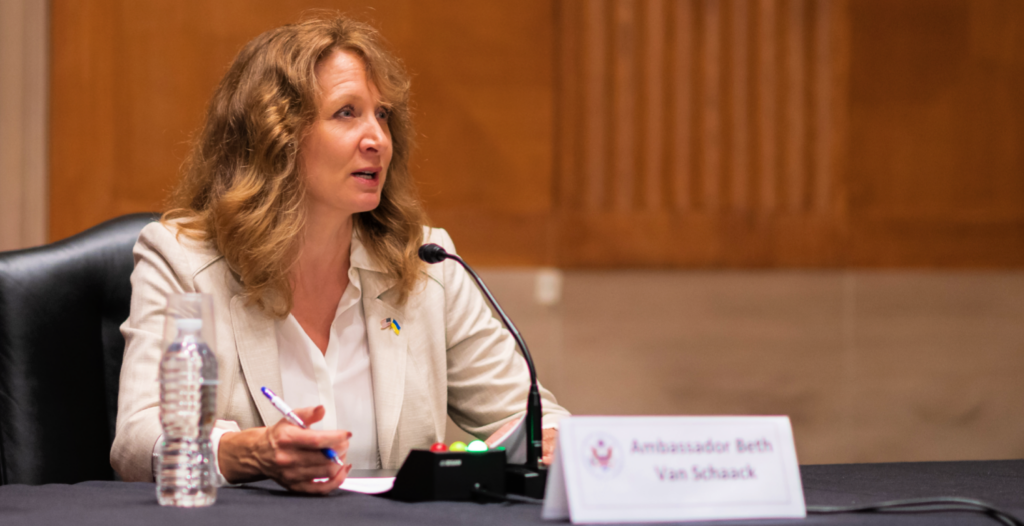WASHINGTON – There has been insufficient progress in implementing the Dayton Agreement, according to members of the Commission on Security and Cooperation in Europe (the Helsinki Commission) in a hearing Tuesday reviewing Bosnia’s future under the agreement which, in late 1995, ended almost four years of conflict in that country, marked by aggression and ethnic cleansing.
Helsinki Commission hearing participants called for the arrest and prosecution of those indicted for war crimes, crimes against humanity and genocide, including Bosnian Serb extremist leader Radovan Karadzic, his military sidekick Ratko Mladic and Yugoslav President Slobodan Milosevic, the mastermind of the conflict. Former Supreme Allied Commander Europe, U.S. Army General Wesley K. Clark, told Helsinki Commissioners that the risks of apprehending individuals has been overestimated. Clark also called for further action as well as democratization in Serbia itself.
Helsinki Commission Chairman Rep. Christopher H. Smith (R-NJ) said Dayton “was certainly a reason for relief, but there was no sense of triumph. Dayton involved compromises, including the division of the country into two entities and negotiating with Slobodan Milosevic, the person most responsible for instigating the conflict.”
“Most of all, Dayton was late,” Smith said. “The world watched people lose their homes, lose their friends and relatives, and lose their lives. The international community can rightfully point to successes, albeit incremental steps. In my view, these successes are reason for hope, not for satisfaction.”
In a prepared statement, Helsinki Commission Co-Chairman Senator Ben Nighthorse Campbell (R-CO) expressed concern about the billions of dollars the United States has invested and the thousands of American troops stationed in Bosnia. Campbell, a former law enforcement officer, said corruption in the region is the single greatest obstacle to Dayton implementation. “The status quo is neither in the interest of the United States nor the Bosnian people,” Campbell added. “The leaders of Bosnia must take ownership for the future of their country.”
“All the money and all the people we devote to Bosnia become meaningless if our policy falls short of doing the right thing,” added Helsinki Commission Ranking Member Rep. Steny H. Hoyer (D-MD). Hoyer called for a “zero-option” for Bosnia. Such a plan would involve “zero displaced persons, zero barriers to safe internal movement for each citizen throughout the country, zero indicted persons at large, zero tolerance to discrimination based on ethnicity.”
Representing the Clinton Administration, Ambassador James Pardew admitted that Dayton is a “cease-fire agreement” and “the basic framework for participatory democracy.” According to Pardew, the agreement left the war-time power structure in place and contains “negotiated compromises, which decentralize political, economic and military institutions below the state level to the entities,” namely the Bosnian Federation and Republika Srpska. Pardew added, however, that renegotiating the Dayton Agreement would only set back existing achievements and that is not in the United States’ best interest.
Ambassador Robert Barry, head of the OSCE Mission in Bosnia, agreed. Some revisions to Dayton are desirable, Barry said. “But to change Dayton you have to implement it first, and through consistent implementation create the kind of consensus needed to make a constitutional amendment possible.” Barry said politicians need to be willing to build a consensus “patiently and persistently.” Barry said he is not satisfied with achievements so far, but felt that “the ice is breaking in Bosnia and Herzegovina” as a result of regular elections.
Former Bosnian Prime Minister Dr. Haris Silajdzic took issue with continuing with Dayton as is. “The Agreement contains both integrative and disintegrative elements, and is not internally consistent,” Silajdzic said, adding that the agreement was the result of compromises made at the time of signature to bring an end to the war. Silajdzic also said the international community has shown “excessive tolerance towards the obstructive tactics of nationalist parties and individuals at all levels, consistently following the line of least resistance.” He called upon the international community to introduce “shock therapy” to ensure country-wide laws are passed and enforced ending corruption and ensuring respect for the rule of law and the rights of citizens, regardless of nationality.
Tuzla Mayor Selim Beslagic concurred while calling Dayton a “wonderful means to stop the war.” “In the intervening years, much has happened,” Beslagic said. “As much as the Dayton Accords were effective against war, they have been problematic for the further development and reintegration of Bosnia and Herzegovina.” Beslagic said the Dayton Accords respected the results of ethnic cleansing. “We must revise Dayton. Bosnia and Herzegovina needs strong central organs.”
Milan Trbojevic, an advisor to Republika Srpska Prime Minister Milorad Dodik, called instead for more time to adjust to the new relationships which Dayton has afforded rather than revising the existing agreement. “We will require the presence of international military and police forces,” Trbojevic said. “We need international experts for the education of our human resources. We need financial support.”
Helsinki Commissioners Reps. Benjamin L. Cardin (D-MD) and Frank R. Wolf (R-VA) both pressed strongly for war crimes prosecution. Rep. Wolf said that efforts at reconciliation across the board also need enhancement while Helsinki Commissioner Rep. Joseph R. Pitts (R-PA), joined by Smith and Hoyer, pressed for the rebuilding of mosques destroyed by Bosnian Serb militants during the war which would have “tremendous spiritual and symbolic value.”
Rep. Eliot Engel (D-NY), who is not a Commission member, nevertheless participated in the hearing to express concern over what he saw as an “open wound” in Bosnia-Herzegovina today. Many questions were raised regarding the return of displaced persons, especially in areas where there are minorities. Despite a recent upswing, the number of returns was universally considered to be way too low. Ambassador Barry added, however, that returns are not just a political question but an economic question as well. Displaced persons need a home and an income to survive, Barry said.
Opening statements from the Commissioners and those submitted by the witnesses are available on the Helsinki Commission web site: www.csce.gov.






